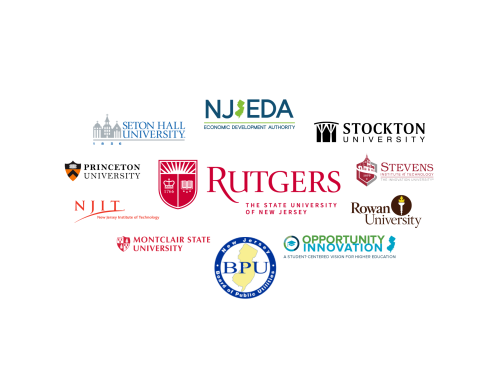Wind Institute OSW Fellowship Program at Rutgers University
Be a Part of a Year-Long Research Fellowship in Offshore Wind!
The Wind Institute Offshore Wind (OSW) Fellowship Program, sponsored by the New Jersey Economic Development Authority, is designed to encourage and support student research in topics that further the development of offshore wind and build student and faculty advisor expertise in offshore wind research and innovation in the state of New Jersey.
Rutgers University serves as one of eight higher education institutions— others include Montclair State University, New Jersey Institute of Technology, Princeton University, Rowan University, Seton Hall University, Stevens Institute of Technology, and Stockton University— that is working together with the New Jersey Board of Public Utilities and Opportunity Innovation to offer upperclassmen students the opportunity to conduct paid, independent research related to offshore wind for the entirety of a year.

Program Benefits
- Receive fellowship stipend for research and related expenses
- Work under the mentorship of a Rutgers University faculty mentor for the duration of a year
- Gain industry knowledge through monthly cohort trainings, guest lecturers, site visits, and other activities
- Present research findings at a symposium in the spring to an audience of government, academic, and industry experts
- Network with leaders in the offshore wind industry and gain exposure to career opportunities

Eligibility
- Undergraduates: Rising juniors and seniors only
- All graduate and professional students, including Masters, Ph.D., M.D., and J.D
- Open to all Chancellor-led Units, including Camden, Newark, New Brunswick, and RBHS
- Open to all fields of study ranging from STEM, arts, humanities, and social sciences (i.e. public policy, urban planning, etc.).
*Note for undergraduate fellows, research experience is not required. However, please note that some projects will require prior course/software knowledge (i.e. physics, Python, Matlab, etc.).

Program Timeline and Stipend Breakdown
Program Duration
Undergraduate Fellows
- May 28, 2024 -April 18, 2025 (1 summer + 1 academic year)
Graduate Fellows
- Fellowship start time for graduate fellows is flexible: Selected graduate fellows graduating in May 2025, may begin in summer 2024. However, fellows who graduate after May 2025, will begin on September 9, 2024, through to August 15, 2025.
Stipend Breakdown
Undergraduate Fellows will receive a total of $15,000 in stipend and an additional $1000 for travel for the duration of the fellowship.
- Summer – undergraduate participants will receive a stipend of $6,500 and a housing stipend of $3,500. Students are expected to work at least 30 hours weekly during the summer.
- Fall and Spring - undergraduate participants will receive a total of $5,000. Students are expected to work at least 8 hours per week during the academic year.
Graduate Fellows will receive a total of $30,000 and an additional $1000 for travel for the duration of the fellowship.
- Stipends will be paid in accordance with the fellow(s)' respective program department's business office protocols. Fellows may be paid biweekly or semesterly (i.e., $7,500 each for fall and spring semesters and $15,000 for the summer).
- Note that this fellowship does not cover tuition remission or fringe benefits for graduate fellows.





Application Information
Undergraduate Applicants-
Requirements
- 500-word essay
- One letter of recommendation
- Unofficial transcript
- Resume
Graduate Fellows
Faculty supervisors/mentors must submit a nomination on behalf of their graduate student(s). This nomination process is the official application for graduate fellows.
- Official nomination letter
- Short description of the research project the nominee (the graduate student) will be working on
- Nominee's resume/CV

Frequently Asked Questions
-
The Wind Institute for Innovation and Training is a newly established institute of the New Jersey Economic Development Authority (NJEDA). It was created to coordinate and galvanize cross-organizational workforce and innovation efforts to position New Jersey as a leader in offshore wind. To learn more visit: https://www.njeda.com/wind_institute/
-
Currently, there are eight universities: Princeton University, Montclair State University, New Jersey Institute of Technology, Rowan University, Rutgers University, Seton Hall University, Stevens Institute of Technology, and Stockton University.
-
For undergraduate fellows, all Rutgers rising juniors (class of 2026) and rising seniors (class of 2025) are eligible to apply.
For graduate fellows, all graduate and professional degree students are eligible to be nominated by a faculty mentor/advisor.
The program is open to all fields of study and to students at all campuses.
-
The program is hybrid. Some projects may be conducted online at the discretion of the faculty mentor. For our monthly activities such as workshops, meetings, and site visits, some are hosted in person, while others are hosted online.
Students will be provided with a calendar of events ahead of time to plan accordingly.
-
Students will work for approximately 40 weeks.
The undergraduate fellows will begin their research experience at the end of May 2024 until April 2025 (fellows will not be required to conduct research during holidays, and university breaks such as winter break and spring break).
Fellowship start time for graduate fellows is flexible: Selected graduate fellows graduating in May 2025, may begin in summer 2024. However, fellows who graduate after May 2025, will begin on September 9, 2024, through to August 15, 2025.
-
Graduate students must be nominated by a faculty advisor. The nomination process is the official application process for graduate students to be considered.
Graduate students may reach out to a faculty or department administrator for nomination requests.
-
No, the fellowship does not cover tuition for either undergraduate or graduate fellows. Fellows are provided with a stipend to use as they see fit.
Meet the Fellows and Faculty Advisors